I said to one of these boys on one occasion, when he came in through a rather heavy fire: "You will get hit one of these days riding about like that when shells are flying." And he replied: "I pedal so quick, sir, they'd never catch me." These boys didn't seem to mind the bullets one bit; they were always ready to carry out orders, though it meant risk to their life every time (Baden-Powell, "Camp Fire Yarn No.1: Mafeking Boy Scouts," Scouting For Boys).
Looking for a Saturday night movie for your next Troop leader training campout? Consider Master and Commander: The Far Side of the World (PG-13): DVDs cost one cent plus postage
This film should inspire your youngest Patrol Leaders because the midshipmen portrayed are 12 or 14 years old and are already in real life leadership positions.
Young Patrol Leaders who have to contend with the friction that arises when leading bigger or older Patrol members will identify with small Midshipman Lord Blankeney. In one scene he readies some of the men in his crew for a quickly approaching boarding party. His task is to get them to attach "neckcloths" to their arm for identification in the heat of battle, "On your right upper arm, to tell friend from foe. Davies, this arm. Starboard arm."

11: Lord Blankeney
Referring to the fact that the 13-year-old has lost his right arm in the movie's opening battle, Davies taunts, "The arm you got, or the arm you don't got?"
Blankeney sets a boundary with the insubordinate adult and replies, "All right, that's enough cheek, Davies." Without missing a beat, he patiently continues to coax the group of men, "Take your neckcloths and put them 'round your right arm."

04: Leadership Training = Skills Instruction. As the Acheron
threatens to catch up with the Surprise, the captain himself teaches midshipmen
how to use a sextant to mark noon: "When its lower limb is touching the
horizon... Williamson, look to your sextant!"
Blankeney's regular "position of responsibility" is as the leader of a gun crew, a patrol-sized group that operates a cannon during sea-battles. When he hears that other boys his age will be in the Captain's boarding party to capture the rival ship "Acheron" in hand to hand combat, he asks the Captain for permission to join. The Captain denies his request, perhaps (we might think) because the boy lacks a right arm. But the Captain has a greater leadership role in mind for him, "You'll lead your gun crew, and then when we board, you'll take command of the ship from here on the quarterdeck. Do I make myself clear?" The boy can scarcely believe what this means, "Take command of the ship? Thank you sir."

07: Witnesses to a flogging.
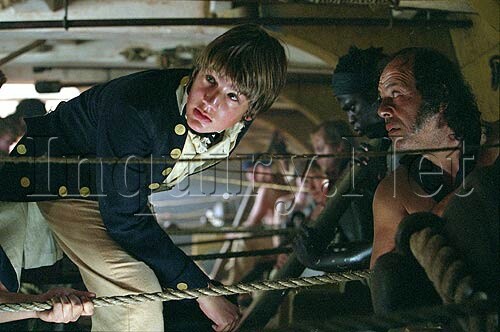
13: The midshipmen command Patrol-sized gun crews:
What Baden-Powell meant by "real responsibility."
Later, as this 13 year-old assumes command of the ship, another midshipman his age is the second person to jump to the deck of the Acheron, only a step behind Russell Crowe's character, Captain "Lucky Jack" Aubrey. So begins the film's climatic battle scene, in which boys the age of your Troop's youngest Junior Leaders consistently display clear-headed and decisive leadership in the ultimate din and confusion of war.
Sample JTL Discussion Questions
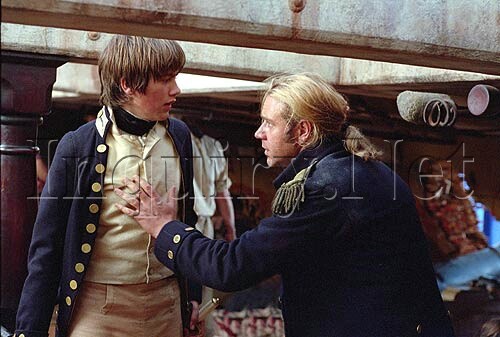
12: Aubrey to Calamy: "Your first command...Now tell me that wasn't
fun."
Every frame of Master and Commander: The Far Side of the World, is about leadership as it is manifested in strength, respect, and discipline. One discussion about the nature of leadership takes place in the cabin of "Lucky Jack Aubrey," the captain. Aubrey has just shown his support of midshipman Hollom by punishing the insubordinate seaman Nagle, a man who followed without hesitation Aubrey's orders to cut the lines to the mizzen topgallant after Hollom arguably delayed long enough to cause it and Nagle's close friend Warley to be blown into the sea.
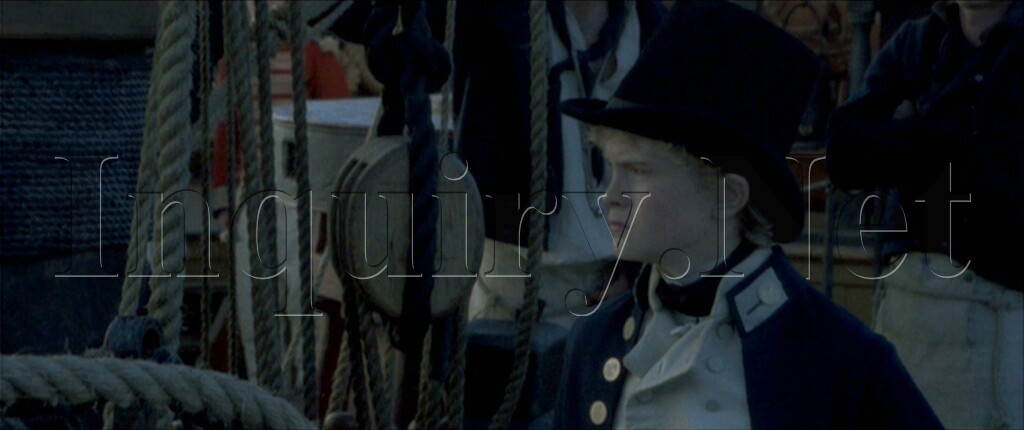
01:
We learn that the captain respects midshipman (the equivalent of a Patrol Leader) Hollom's abilities as a sailor (the equivalent of Scoutcraft skills) but that Hollom has failed his lieutenant advancement exams (an outside board of review that tests leadership skills) twice.
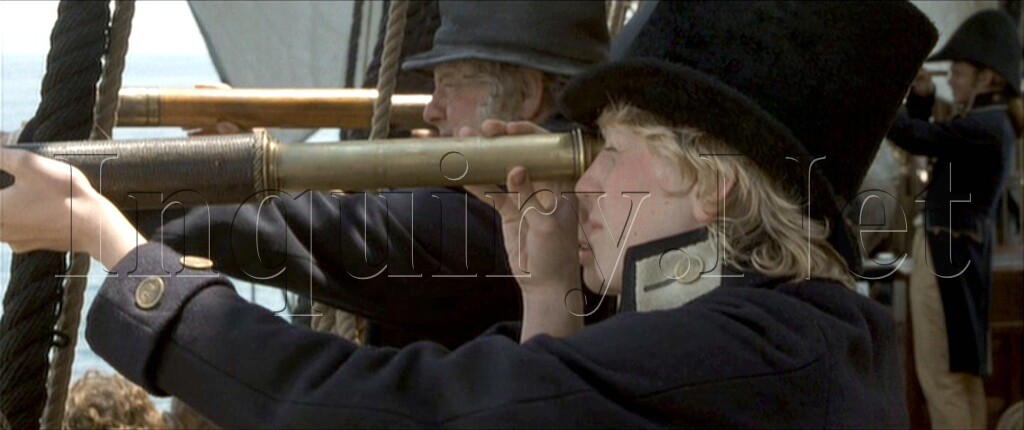
The Captain's public display of support gives Hollom one last chance to follow Aubrey's advice, "Look, Hollom, its leadership they want. Strength. Now you find that within yourself and you will earn their respect. Without respect true discipline goes by the board."
"Yes, sir ... um strength, respect, and discipline, sir."
The JLT discussion can be opened with something like,
| The captain gives Hollom advice on leadership, but it doesn't seem to work. Why not? Was it bad advice? | |
| When do midshipmen Boyle, Calamy, and Blankeney exhibit strength? Does this earn the crew's respect, and discipline, or do the men merely fear the lash? | |
| When Hollom hears the ship's crew whispering that he is a 'Jonah', he panics and runs to the other midshipmen, panting and coughing. Calamy (a gifted junior leader) says that he is not ill, but just dodging work as usual. Blankeney stands up to Calamy (his best friend), and then tries to comfort Hollom. What points of the Scout Law do Blankeney's actions represent?" |

03: Midshipman Calamy at the captain's table.
In other scenes we see that it is not just Hollom's crew members that do not respect him. The other midshipmen, including Calamy, resent his inability to lead because of the burden (and jeopardy) it places on them. In one of the deleted scenes the 13-year-old "junior leaders" flick things at Hollom as he plays the guitar.
| Hollom is responsible for the discipline in his crew just as you are responsible for running your Patrol. When do you think the Scoutmaster should step in? |
This is a difficult issue because it involves the fears of many Junior Leaders.

Midshipman Blankeney at the captain's table.
| The boy leaders in Master and Commander are younger than most of you, but they command Patrol-sized adult gun crews in a 'man-of-war.' Would this be possible without the ultimate threat of the lash? | |
| The Captain's best friend, Stephen Maturin says that it is uncalled for just because 'the man failed to salute.' He also says that mutinies are understandable. What do you think? | |
| Captain Aubrey accuses his friend of being an anarchist, what is anarchy? Have you ever seen a lack of respect cause anarchy? | |
| What does Aubrey mean by 'true discipline'? | |
| We don't use 'corporal punishment' in Scouts, but sometimes we do ask a Scout to leave. How does respect allow our Troop to be 'boy-run'? | |
| Adults sometimes say that the most difficult Scouts are the ones that need Scouting the most. What do you think about that? When should we kick someone out of Scouts? | |
| Captain Aubrey says he can only afford one rebel aboard his ship, how many rebels can you guys handle? |
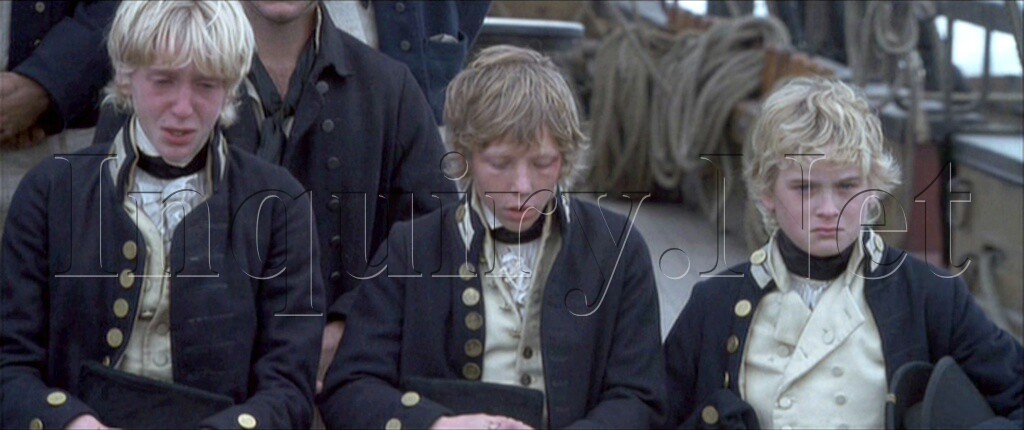
Hollom's death offers a opportunity to explore the relationship of Scout
Spirit to leadership in the community:
| "In all the world, the only one to offer Hollom a kind word is Lord Blankeney. Is there a 'Jonah' at your school? How do you treat him?" |
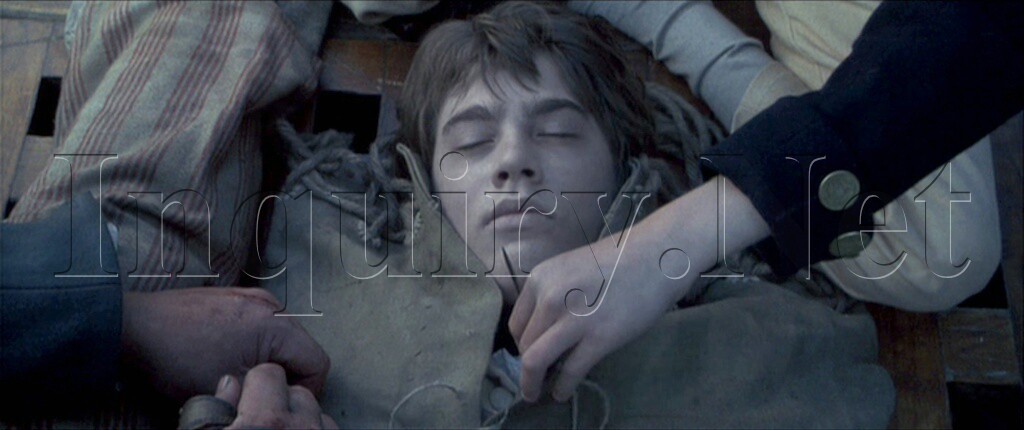
09: When Lord Blankeney realizes he is likely to die: "Joe said when you
die, they stitch you in your hammock with the last stitch in your nose, just to
make sure you're not asleep. Not through the nose, Calamy. You'll tell
them?"
There are those who dismiss young Lord Blankeney's virtues because of his privileged upbringing, but his selfless acts of courage and kindness (for instance, when he offers the devastated Dr. Maturin a "Galapagos beetle") embody the combination of intelligence and emotion we call the "Spirit of Scouting".
As the film's title, "Master and Commander," implies, this film is about competency and leadership. Good historical fiction always contains messy contractions, like the sharply contrasting world-views of the old-fashioned, superstitious captain and his modern, scientific friend, the ship's physician and Fellow of the Royal Society.
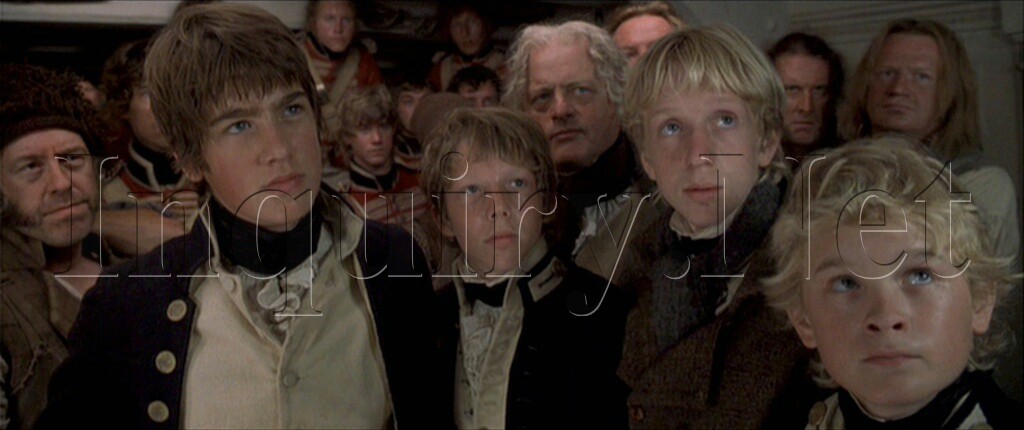
08: B-P's version of Patrol-based citizenship training: "This ship is
England."
Tim Jeal, in his biography Baden-Powell wrote, "At the heart of Scouting lay a whole series of incompatible aims, not the least of which was an undertaking to produce self-assertive independent young men who would nevertheless remain loyal supporters of the status quo."
Those who dread a free-wheeling discussion with their Junior Leaders might decide to pick a film with allegory less robust. Certainly, a tale in which a one-armed 13-year-old boy competently assumes command of a man-of-war ship facing overwhelming odds in a battle at sea would be a poor choice for Scoutmasters who forbid 13-year-old Eagles!
Transcript of the film at:
http://www.script-o-rama.com/movie_scripts/m/master-and-commander-script-transcript.html
William "Green Bar Bill" Hillcourt's "Real Responsibility" Patrol Leader Training:
http://inquiry.net/patrol/green_bar/index.htm
